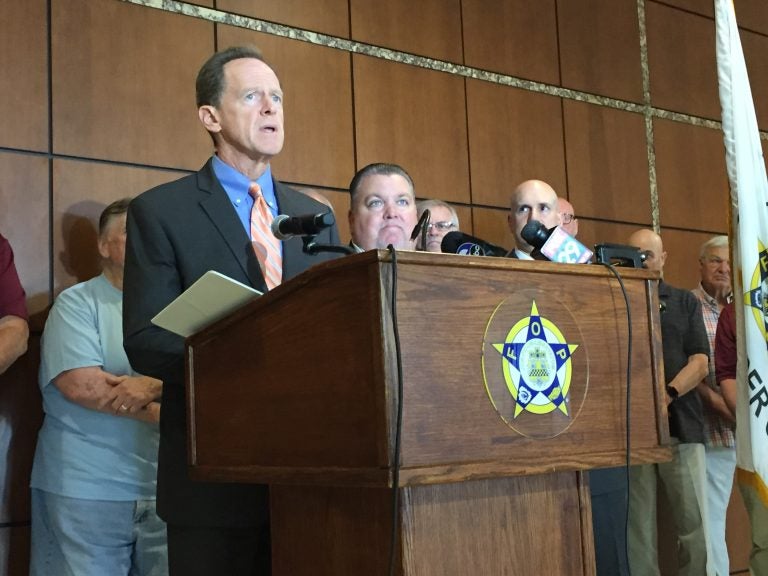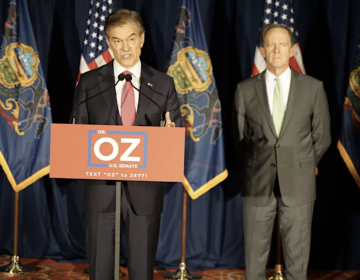Backing the blue or empty gesture? Toomey boosts bill to punish cop killers
Pennsylvania Senator Pat Toomey has reintroduced the Thin Blue Line Act. Some say it will bring justice for slain cops. Others think it’s an empty political gesture.

Pennsylvania Senator Pat Toomey has reintroduced the Thin Blue Line Act. Some say it will bring justice for slain cops. Others think it’s an empty political gesture. (Avi Wolfman-Arent/WHYY)
U.S. Senator Pat Toomey wants the full weight of the law to come down on criminals who kill or target police officers.
The Republican from Pennsylvania recently reintroduced the Thin Blue Line Act, an attempt to increase the likelihood that those convicted of killing law enforcement officers receive the death penalty in federal cases.
“If you murder or target a police officer for murder, you should expect the harshest possible penalty,” Toomey said Monday at the headquarters of Philadelphia’s police union.
This bill first surfaced in 2017 and earned relatively easy passage in the House. It did not, however, come up for a vote in the Republican-controlled Senate.
Toomey pinned the failure Democrats, saying those who oppose the death penalty in all forms obstructed the bill in its first run.
Back in 2017, skeptics of the bill called it unnecessary and said it would only inflame tensions between police and the communities they serve.
Todd Cox of the NAACP’s Legal Defense Fund wrote in an op-ed that the legislation “prioritize[s] divisive political pandering over meaningful reform.”
Several law enforcement groups — including the Fraternal Order of Police — back Toomey’s bill.
The measure applies to federal death penalty cases, where a jury is deciding whether a convict should be executed.
In these cases, the law lays out “aggravating factors” the jury should consider when mulling its decision — factors such as prior convictions, premeditation, and the cruelty of the act itself. The more “aggravating factors” lined up against the assailant, the more likely he or she earns the death penalty.
Right now, killing a federal law enforcement official would be an “aggravating factor.”
Toomey’s bill expands this definition to include state and local first responders.
And so the bill would apply to cases where someone commits a federal crime punishable by death, but one of the victims is a state or local police officer.
Toomey wants the bill to send a message: that society considers criminals who kill members of law enforcement especially dangerous.
“That is the most dangerous type of person in our society and that’s why this is an appropriate response,” said Toomey on Monday.
John McNesby, the president of Philadelphia’s police union, believes Toomey’s bill could act a deterrent.
“Something like this will never bring anybody back, but it could curtail something in the future,” McNesby said.
Critics, however, say the bill is simply political smoke and does nothing more to protect police.
Mary Catherine Roper, deputy legal director of the ACLU of Pennsylvania, said almost every federal death penalty case that involved the killing or targeting of a police officer would already include several “aggravating factors.”
Those that kill local police officers, she added, would also be subject to the harshest possible state-level punishments. Those punishments would include the death penalty in states that allow it.
Toomey’s bill, Roper argued, amounted to “double and triple billing on the same type of criminal activity.”
“Why don’t they do something we need them to do?” she said.
Federal death penalty cases are rare, in part because most homicide cases are state cases. The last person executed under federal law for the murder of law enforcement officials was Oklahoma City bomber Timothy McVeigh.
Boston marathon bomber Dzhokhar Tsarnaev has been sentenced to death, but not yet executed.
Toomey said his bill was necessary because it would expand the death penalty’s applicability in certain cases that involve the killing or targeting of local officers.
“There’s nothing redundant about this legislation,” he said.
WHYY is your source for fact-based, in-depth journalism and information. As a nonprofit organization, we rely on financial support from readers like you. Please give today.





